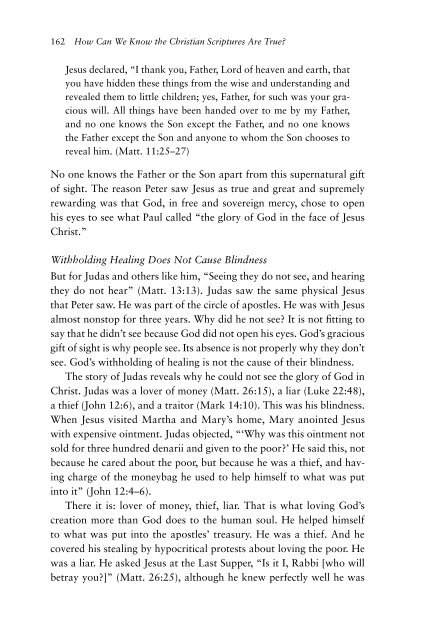Scriptures selfattesting authority question doctrine truthfulness Scriptures
peculiar-glory-en
peculiar-glory-en
Create successful ePaper yourself
Turn your PDF publications into a flip-book with our unique Google optimized e-Paper software.
162 How Can We Know the Christian <strong>Scriptures</strong> Are True?<br />
Jesus declared, “I thank you, Father, Lord of heaven and earth, that<br />
you have hidden these things from the wise and understanding and<br />
revealed them to little children; yes, Father, for such was your gracious<br />
will. All things have been handed over to me by my Father,<br />
and no one knows the Son except the Father, and no one knows<br />
the Father except the Son and anyone to whom the Son chooses to<br />
reveal him. (Matt. 11:25–27)<br />
No one knows the Father or the Son apart from this supernatural gift<br />
of sight. The reason Peter saw Jesus as true and great and supremely<br />
rewarding was that God, in free and sovereign mercy, chose to open<br />
his eyes to see what Paul called “the glory of God in the face of Jesus<br />
Christ.”<br />
Withholding Healing Does Not Cause Blindness<br />
But for Judas and others like him, “Seeing they do not see, and hearing<br />
they do not hear” (Matt. 13:13). Judas saw the same physical Jesus<br />
that Peter saw. He was part of the circle of apostles. He was with Jesus<br />
almost nonstop for three years. Why did he not see? It is not fitting to<br />
say that he didn’t see because God did not open his eyes. God’s gracious<br />
gift of sight is why people see. Its absence is not properly why they don’t<br />
see. God’s withholding of healing is not the cause of their blindness.<br />
The story of Judas reveals why he could not see the glory of God in<br />
Christ. Judas was a lover of money (Matt. 26:15), a liar (Luke 22:48),<br />
a thief (John 12:6), and a traitor (Mark 14:10). This was his blindness.<br />
When Jesus visited Martha and Mary’s home, Mary anointed Jesus<br />
with expensive ointment. Judas objected, “‘Why was this ointment not<br />
sold for three hundred denarii and given to the poor?’ He said this, not<br />
because he cared about the poor, but because he was a thief, and having<br />
charge of the moneybag he used to help himself to what was put<br />
into it” (John 12:4–6).<br />
There it is: lover of money, thief, liar. That is what loving God’s<br />
creation more than God does to the human soul. He helped himself<br />
to what was put into the apostles’ treasury. He was a thief. And he<br />
covered his stealing by hypocritical protests about loving the poor. He<br />
was a liar. He asked Jesus at the Last Supper, “Is it I, Rabbi [who will<br />
betray you?]” (Matt. 26:25), although he knew perfectly well he was


